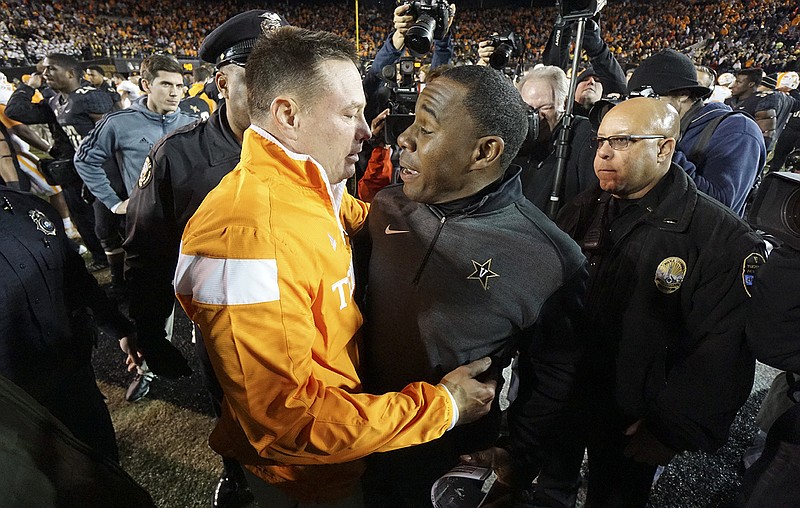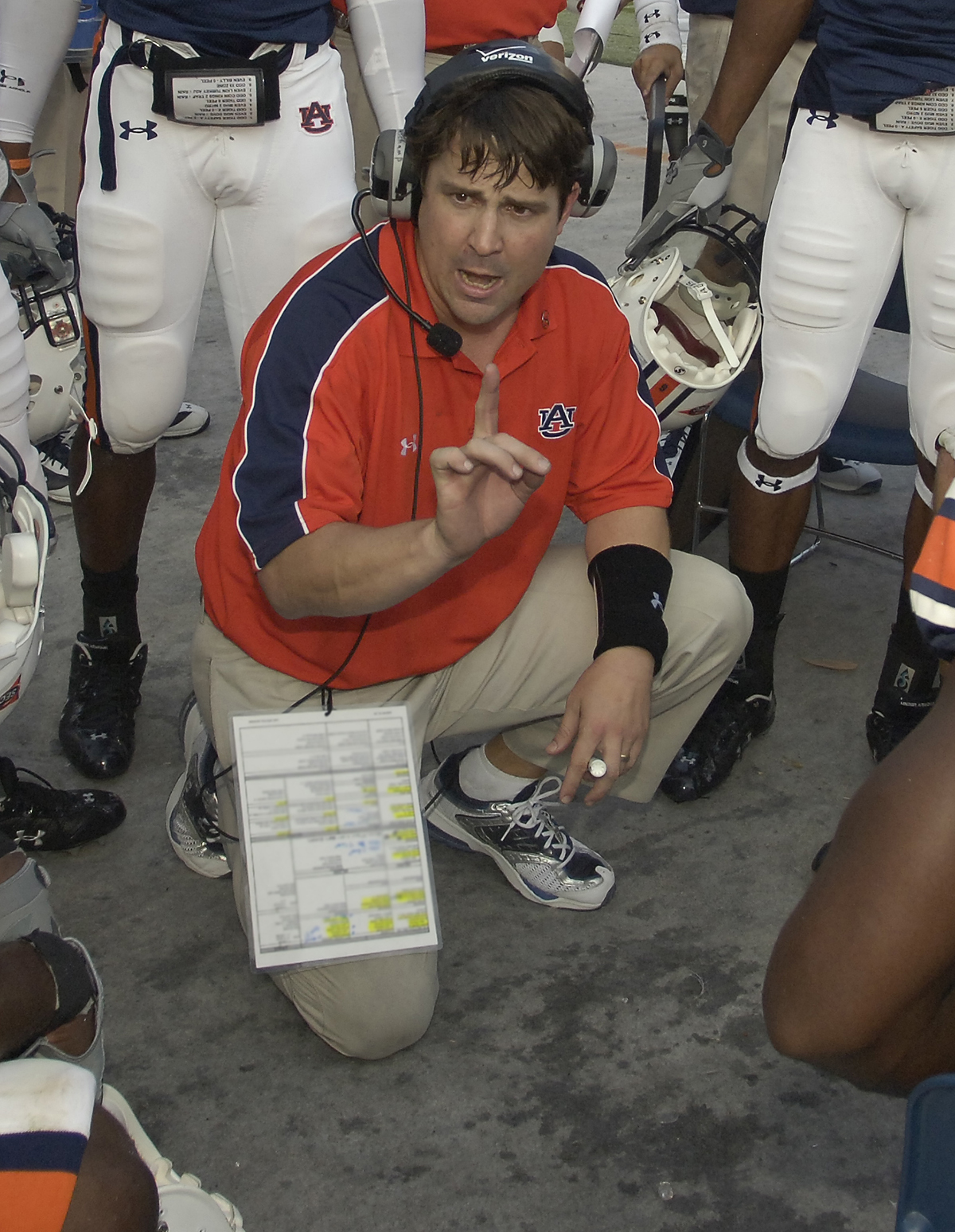Read more
Tennessee Vols collect rings for winning TaxSlayer Bowl
DEFENSIVE ALTERATIONS
The SEC has eight new defensive coordinators for the 2015 season: SCHOOL COORDINATOR COMMENT Auburn Will Muschamp Muschamp is Auburn's fourth DC in past five seasons Florida Geoff Collins Collins spent the past four seasons at Mississippi State LSU Kevin Steele Served last season as Alabama's inside linebackers coach Mississippi State Manny Diaz Was State's DC in 2010 before leaving for Texas Missouri Barry Odom Worked as safeties coach of the Tigers from 2009-11 South Carolina Jon Hoke Spurrier's last DC at Florida, replacing Bob Stoops Texas A&M John Chavis Spent 14 years as Tennessee's DC and six with LSU Vanderbilt Derek Mason Was DC for Stanford's Pac-12 champions of 2012-13
It's easier to name the Southeastern Conference football teams with the same defensive coordinator as last season.
Alabama's Kirby Smart, Georgia's Jeremy Pruitt and Tennessee's John Jancek comprise half of the league's defensive coordinators who retained their jobs from a year ago, with eight of the 14 members having undergone changes. Will Muschamp is in his second go-around as Auburn's defensive coordinator, as is Manny Diaz at Mississippi State, while Vanderbilt head coach Derek Mason has added defensive coordinator responsibilities in his second season with the Commodores.
"I'm excited to take on the duty," Mason said. "The way I look at it, there are several offensive head coaches across the country calling plays, and I believe there is an opportunity for a defensive coach to do it as well. This is that opportunity, and I spend time with my staff making sure that my day is structured to where I can split it.
"Football is a split work day anyway, because there is always some type of administrative duty to get done."
No SEC team was immune to defensive struggles last season, including league champion Alabama, which allowed 99 points in its final three games. Auburn gave up more than 30 points in its last six games against Bowl Subdivision opposition, which resulted in Ellis Johnson's departure and Muschamp becoming the highest-paid assistant in college football history at $1.7 million annually.
South Carolina coach Steve Spurrier grew tired of watching his Gamecocks get shredded, so he hired Jon Hoke to head the secondary and coordinate the defense. Last year's defensive coordinator, Lorenzo Ward, remains on staff and will focus on the front seven.
"We gave up more yards and more points than any South Carolina team ever, so we had to make some changes," Spurrier said. "Bret Bielema showed last year at Arkansas what changing a coordinator on defense can do, because they went from a struggling defense to one of the best in the country last year. If we could do that, then we're going to have a really good team this year."
Arkansas was indeed one of the rare SEC teams that went in a stingier direction last season, with Robb Smith's defenders allowing 323.4 yards per game after the Razorbacks yielded 413.4 in 2013.
Hoke was Spurrier's defensive coordinator at Florida from 1999 to 2001 before spending the past 13 seasons in the NFL. Missouri coach Gary Pinkel brought back a familiar face as well, with new defensive coordinator Barry Odom having served as safeties coach for the Tigers from 2009 to '11.
Odom is replacing Dave Steckel, a longtime sidekick of Pinkel who opted this past winter to take his first head-coaching job at Missouri State.
"Barry has been here before," Pinkel said. "He was a football operations guy for me and wanted to get into coaching, and now he wants to be a head coach and will someday. Barry knows how we do things here and that we have specific ways in how we coach and teach and communicate.
"For him, the transition was remarkably easy, which I knew it would be."
Though familiarity has aided the multiple transitions throughout the conference, stopping up-tempo offenses has become another matter. The SEC had five of the nation's top 10 defenses in 2011, when LSU's 9-6, old-school overtime clipping of Alabama served as the biggest regular-season contest, but there were league games last year that featured scores of 55-44, 63-31, 41-38 and 45-42.
Maybe it's the optimism that tends to accompany the blooming months, but several SEC coaches already have sensed tangible improvement.
"In spring practice, we seemed to get lined up better and seemed a little more organized," Spurrier said. "We think we're going to play a lot better on defense. We struggled a lot last year and didn't have any defensive players drafted, so we weren't quite as talented as we had been here."
Said Mason: "I thought our defense made some strides. It's the same system, and it's a better opportunity for us to understand what my thought process is. We were a more cohesive unit this spring, and we communicated better."
Mason had seen enough by last Thanksgiving, when his Commodores were coming off a 51-0 loss at Mississippi State. He took over the defensive calls from David Kotulski before the season finale against Tennessee, and there was a notable difference in the 24-17 loss to the Volunteers.
Kotulski was let go a few days later, and Mason hopes what transpired against Tennessee can serve as a springboard to better defensive days ahead.
"I interviewed several guys, but I went through the process a year ago about what I expected to see," Mason said of his unique decision. "I understand our talent and what I schematically want to do in competing with some of these offensive schemes that we're seeing, and with that being the case, I moved from talking to other people to spending more time with my staff for some feedback.
"In the end, I decided that instead of going outside, I would just keep it in house."
Contact David Paschall at dpaschall@timesfreepress.com or 423-757-6524.

